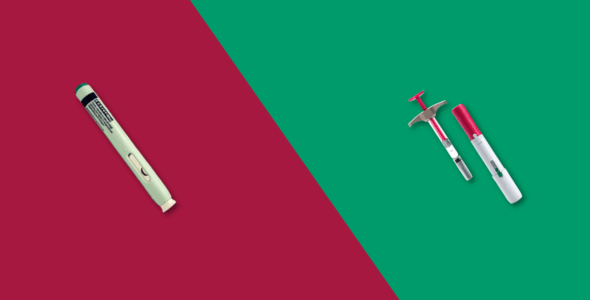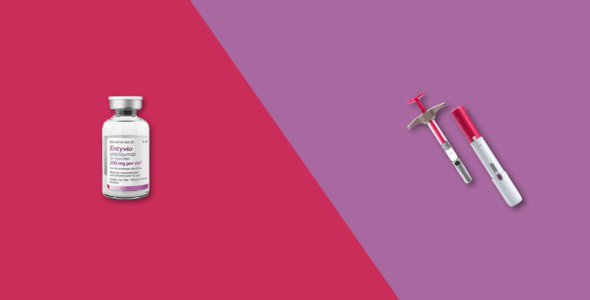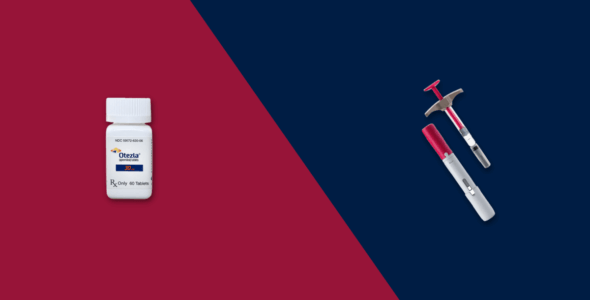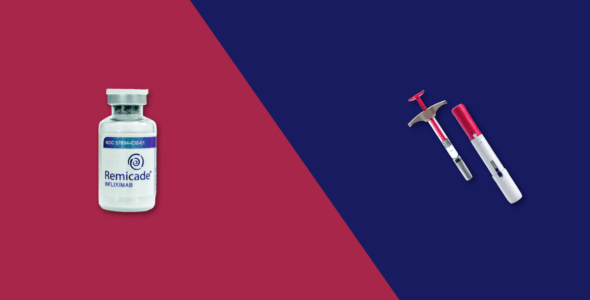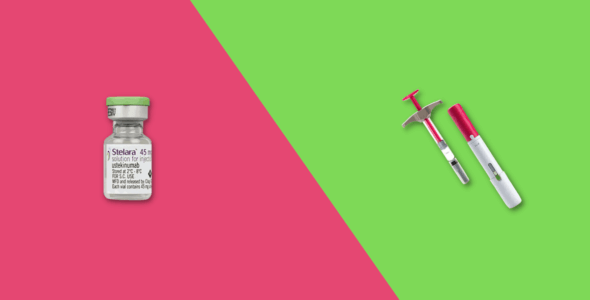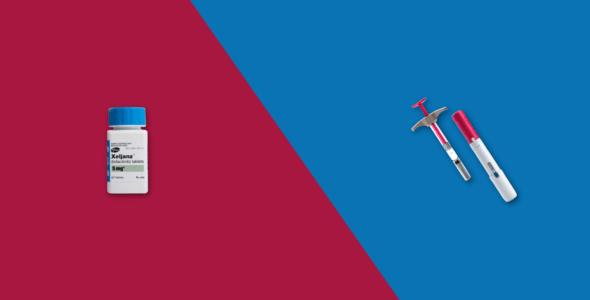Have you been recommended Skyrizi or Humira for your plaque psoriasis? A wide range of treatment options for this condition are available and if your symptoms are particularly severe you may have seen a dermatologist. Skyrizi and Humira are both recommended in the American Academy of Dermatology’s psoriasis treatment guidelines. Skyrizi and Humira are subcutaneous injection treatments known as biologics that reduce inflammation by targeting overactive cells in the immune system. Read on to find out more about how these treatments work, as well as the similarities and differences between Skyrizi and Humira, so you and your doctor can make the best decisions for your treatment.
What is Skyrizi?
Skyrizi is the brand name of risankizumab-rzaa, manufactured by Abbvie Inc. It is a prescription medication that reduces how much inflammation your immune system can trigger, helping to clear your skin. It has U.S. Food and Drug Administration (FDA) approval to treat adults who have
- Moderate to severe plaque psoriasis who are candidates for systemic therapy or phototherapy
- Active psoriatic arthritis (PsA) in adults
The active ingredient in Skyrizi is called risankizumab. It is a type of antibody protein that has been designed to specifically target and deactivate an immune system protein interleukin 23 that causes inflammation. Skyrizi is classed as an interleukin-23 (IL-23) antagonist.
How does it work?
When you take Skyrizi, risankizumab attaches to the interleukins released by your white blood cells. This blocks the interleukins, stopping them from attaching to skin cells and triggering inflammation. In turn, this limits how much inflammation your immune system can cause in your skin, reducing the severity of your plaques and clearing areas of your skin.
What is Humira?
Humira is an immunosuppressant medication classed as a tumor necrosis factor (TNF) inhibitor. It is prescribed to adults and children to treat inflammatory autoimmune diseases and some other similar inflammatory diseases.
Humira is approved by the FDA to treat the following inflammatory autoimmune diseases:
- Moderate to severe plaque psoriasis in people who are candidates for systemic therapy or phototherapy
- Active psoriatic arthritis in adults
- Rheumatoid arthritis in adults
- Ankylosing spondylitis in adults
- Ulcerative colitis in adults
- Juvenile idiopathic arthritis in children aged 2 years and older
Humira is also approved to treat similar non-autoimmune inflammatory diseases:
- Crohn’s Disease in adults and children aged 6 years and older
- Hidradenitis suppurativa (HS) in adults and children aged 12 years and older
- Uveitis in adults and children aged two years and older
How does it work?
Once Humira is injected into your body, the active ingredient adalimumab helps reduce inflammation. Your immune system releases a protein in your body to trigger inflammation called TNF-alpha (tumor necrosis factor-alpha). Adalimumab attaches to TNF-alpha and stops it from working. This limits the amount of inflammation your immune system can cause.
By reducing inflammation, Humira can provide relief from the symptoms of inflammatory diseases. It can also limit the damage they cause and can stop flare-ups from happening.
How do you take Skyrizi and Humira?
You take Skyrizi and Humira by subcutaneous injection (injecting it under your skin) using either a pre-filled syringe or an injectable pen. It is important to use a new needle each time to prevent the risk of infection. You may have injection site reactions such as redness, bruising, or irritation after administration that will settle down after a few hours.
Is Skyrizi more effective than Humira?
Both drugs are effective options for treatment but Skyrizi has shown to be more effective in treating psoriasis.
A 2019 study published in The Lancet by Reich K, compares Skyrizi head-to-head with Humira in patients with moderate-to-severe plaque psoriasis. This clinical trial involved over 600 patients from 11 countries who were randomly given either Humira or Skyrizi. The primary endpoints looked at in the study were the Psoriasis Area Severity Index or PASI 90 (90% improvement from baseline). At week 16, PASI 90 was achieved in 72% of patients given risankizumab and in 47% of patients given adalimumab. Therefore Skyrizi showed better skin clearance than Humira for psoriasis.
Another advantage of Skyrizi is its dosing schedule, it involves fewer injections than Humira. After the first two initial doses of Skyrizi, it is only injected every 12 weeks while Humira is injected every two weeks.
Determining which medication is right for a particular patient requires a personalized assessment of each patient. Other medication options that can be considered for treating psoriasis, include Otezla, Taltz, Cosentyx (secukinumab), Tremfya (guselkumab), and Stelara (ustekinumab).
What are the side effects of Skyrizi and Humira?
The most common side effects of Skyrizi include:
- Upper respiratory infections
- Injection site reactions
- Headache
- Feeling tired
- Fungal skin infections
Common side effects of Humira include:
- Upper respiratory infections
- Injection site reactions
- Headaches
- Rash
- Nausea
Both Skyrizi and Humira may interact with live vaccines, for more medical advice on drug interaction contact your healthcare professional. You can also read more about each drug on the manufacturer’s websites in the full prescribing information, skyrizi.com, and humira.com
How should Humira be stored?
Humira needs to be stored in a refrigerator (2°C-8°C/36°F-46°F), in its original container and protected from light until it’s used.
Is it possible to switch between Skyrizi and Humira?
Yes, but you must talk with your doctor about the possible benefits of switching and the best way to do so. Be sure to discuss the reasons why you want to switch drugs. You will be asked to wait a certain amount of time before switching between these two medications.
Who makes Skyrizi and Humira?
Both Skyrizi (risankizumab-rzaa) and Humira (adalimumab) are manufactured by Abbvie Inc, a biopharmaceutical company with headquarters in North Chicago. Immunology is their main area of research and development. Humira’s patent expires in 2023 and several biosimilars are expected to be released. Abbvie hopes to counter this with sales of Skyrizi and other immunology drugs like Rinvoq (upadacitinib) and expand their indications to treat atopic dermatitis.

